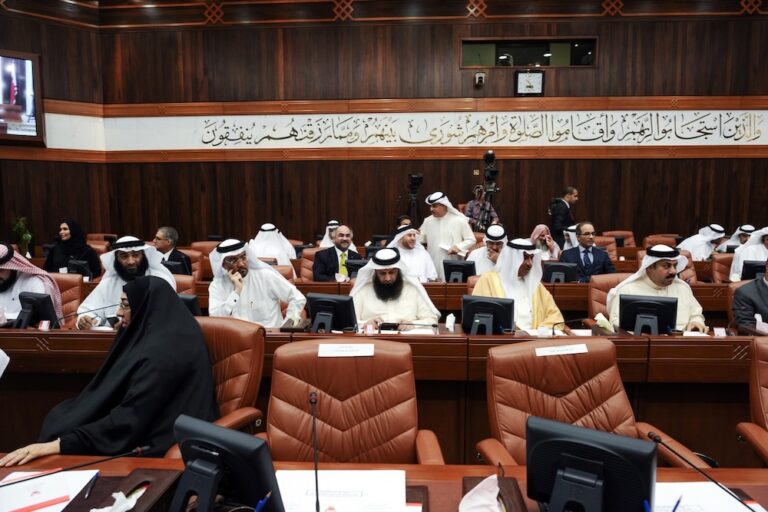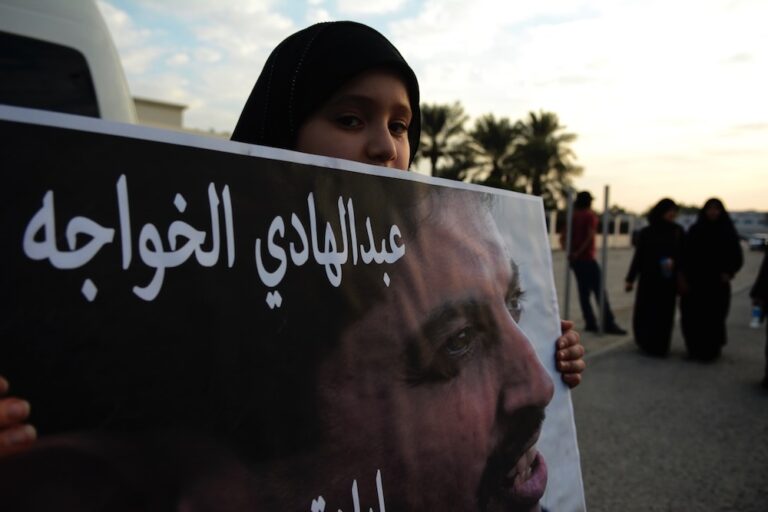Mohammed AlSawad, of "AlBilad" newspaper, was convicted for having reported on an investigation concerning former state minister Mansoor Bin Rajab.
(BCHR/IFEX) – 31 January 2011 – BCHR expresses concern about the Bahraini authorities’ practice of targeting journalists and writers and putting them on trial, in order to restrict freedom of speech, and as an attempt to conceal information from domestic and international public opinion.
On 30 December 2010, after a trial that lasted about 6 months, the criminal court fined Mohammed AlSawad, a journalist at “AlBilad” newspaper, 50 Bahraini Dinars (approx. US$130). The journalist was convicted on charges of spreading news and information about former State Minister Mansoor Bin Rajab, when the issue was subject to a gag order imposed by the Attorney General.
The public prosecution based their case against AlSawad on the penal code of 1976 which states that: “The crime of publishing any information about an investigation, if the investigation authorities had decided that it should be conducted in the absence of liabilities or had banned the broadcast in the interest of public order, morality or the emergence of truth, will be punishable by imprisonment for a term not exceeding one year or a fine not exceeding one hundred dinars”.
AlSawad, for his part, noted that “the purpose of publication is to inform the public about the outcome of the biggest cases in the public interest.”
The journalist reported on the issue of the former state minister in a 1 June article which appeared in “AlBilad” newspaper. The paper is known to support the Prime Minister. The issue has preoccupied the public’s attention since an investigation into the affairs of the former state minister was launched in March after he was accused of laundering funds at home and abroad.
(. . . )
Months after the investigation was launched, the state minister has not been brought to trial and there were no announcements of any developments. On the other hand, AlSawad has been sentenced. According to BCHR, the press is under a very repressive atmosphere especially since the trial of a number of activists is taking place at the same time, which is another example of an investigation under a gag order. It seems that the verdict against AlSawad was intended to promote self-censorship among the journalistic community and prevent any further violation of gag orders.
Taking advantage of the judiciary’s lack of independence, the Bahraini authorities usually prevent the publication of news on any issues that might cause them embarrassment or stir up the public. In October 2006, the criminal court issued a gag order on the biggest scandal which shocked the country. An influential member of the ruling family, Ahmad Bin Atiyatallah Al-Khalifa, was involved. He is Minister of State for Cabinet Affairs. This “Albandar” scandal was named after the person who unveiled it, former government advisor, Salah Albandar. This gag order remains in effect until this very day without any logical reason.
These practices are a clear violation of freedom of opinion and expression as well as people’s right to access accurate information, especially as provided for in the second paragraph of Article 19 of the International Covenant on Civil and Political Rights, which stipulates, “Everyone shall have the right to freedom of expression; this right shall include freedom to seek, receive and impart information and ideas of all kinds, regardless of frontiers, either orally, in writing or in print, in the form of art, or through any other media of his choice.”
Based on the above, BCHR appeals to the authorities to:
1. Withdraw the sentence against AlSawad.
2. Stop the continuous targeting of journalists and writers and provide a healthy platform for them so that they can carry out their duties without pressure or intimidation.
3. Halt the use of the judiciary system as a tool to crack down on journalists, and to suppress freedom of opinion and expression. Moreover, put an end to the controls imposed on the media through the use of laws which restrict freedoms.
4. Immediately lift the gag orders placed on issues of public concern, such as the case concerning the former state minister and the Albandar scandal.


